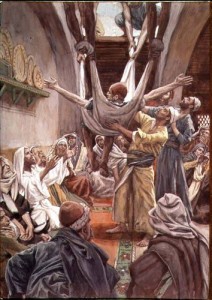When everything is going well, it is easy for us to live the Orthodox way of life. Praying is not a burden. It is easy to fast. We are generous with alms. We are not troubled by our sinful desires.
(2nd Sunday of Great Lent) (Mark 2:1-12)
In today’s reading from the Gospel according to St. Mark, we hear of the healing of a man who is sick with palsy; a condition that may refer to being paralyzed, with weakened muscles and possible tremors. He is all of us:paralyzed by sins, weakened by worldly thoughts and ways of life, and unsteady in all our ways.

The Palsied Man Let Down Through the Roof, illustration for 'The Life of Christ', c.1886-94 (gouache on paper) by Tissot, James Jacques Joseph (1836-1902)
When everything is going well, it is easy for us to live the Orthodox way of life. Praying is not a burden. It is easy to fast. We are generous with alms.We are not troubled by our sinful desires. But when the going gets tough, such as when we are sick, things are different. It’s difficult to pray. Fasting becomes a challenge. We don’t think of others, only of ourselves. We often indulge our weaknesses, using our sickness as an excuse.
The fathers teach us that we find out who we truly are in times of temptation and adversity, such as being ill. We are pushed by circumstances, challenged, and so reveal who we are. In the case of the man sick of the palsy, we might suppose that he realized his condition, and asked to be brought to the Lord for His help. If we are wise, we will do the same whenever we find ourselves in difficult circumstances.
Our Lord does not immediately heal the man; but rather, forgives his sins.We don’t usually like to consider this, but there is usually a connection between our physical state and our spiritual condition; and when we are ill spiritually, we may find this causing physical illness as well. Of course, we should always be considering how we live, and confessing and repenting when we find that we have sinned; and we should give thanks to God for the difficult circumstances that show us who we are, and how much work we each still have to do to become the person God wants us to be.
When the man sick of the palsy is healed in his body, our Lord tells him to take up his bed and walk. By doing so, the man shows that he has truly been healed; and, we are meant to know, that his sins were, indeed, forgiven. So it is with us. When we have examined our lives, and repented of, and confessed, our sins, the promise of God is that our sins, also, are forgiven.Trusting in the mercy of God, we, also, should take up our beds and walk – that is to say, we should also show, in deeds as well as in words, that we have been changed, that our souls have been healed. There should be something different in who we are, and in what we say and do, after we have repented and confessed. If there is nothing different, we need to ask ourselves whether we truly have repented, whether we have confessed everything – and again, if we find anything, repent, and confess – and be different.
As we journey through this time of Great Lent, this season of preparation for the celebration of our Lord’s Pascha, His triumph over death on our behalf, let us ask God for His grace to see our illnesses and our weaknesses and our wickedness; let us ask for grace to repent and confess; let us ask Him to forgive and heal us; and let us then take up the labor of living the life of Christ for all to see, to the glory of God, and the salvation of our souls.
Source: Rumblings from a Desert Cave
PRIEST JOHN MCCUEN | 20 MARCH 2011
